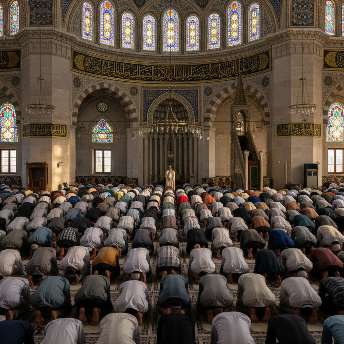Friday (Yawm al-Jumuah) is the most blessed day of the week for Muslims. It is the day when believers gather for the Jumuah prayer, a weekly congregational worship that holds immense importance in Islam. The Friday prayer is not just a ritual but a reminder of faith, unity, and brotherhood among Muslims. Allah has given this day a special status, and Prophet Muhammad ﷺ emphasized its virtues in numerous Hadiths.
In this article, we will explore the importance of Jumuah prayer, its Sunnah practices, benefits, and how Muslims can maximize rewards on this sacred day.
The Importance of Friday in Islam
Friday is not an ordinary day in Islam. It is a weekly Eid for Muslims, a day full of blessings and mercy.
Allah mentions Friday in the Quran:
“O you who believe! When the call is proclaimed for the prayer on Friday, hasten earnestly to the remembrance of Allah, and leave off business. That is best for you if you only knew.” (Surah Al-Jumuah 62:9)
This verse highlights that Jumuah prayer is obligatory for Muslim men and must be given priority over worldly affairs.
Virtues of Friday
- Creation of Adam (A.S.) took place on Friday.
- The Day of Judgment will occur on Friday.
- It is a day when dua (supplication) is readily accepted.
- Angels record the names of those who attend Jumuah early.
The Prophet ﷺ said:
“The best day the sun rises over is Friday; on it Allah created Adam, on it he was admitted to Paradise, and on it he was expelled from it. And the Hour will not be established except on a Friday.” (Muslim)
Jumuah Prayer: An Obligation
The Friday prayer is a fard (obligatory) act for every adult Muslim man who is not traveling. Women, children, and the sick are exempt but are rewarded if they attend.
Skipping Jumuah without a valid excuse is a major sin. The Prophet ﷺ warned:
“Whoever neglects three Jumuah prayers, Allah will place a seal over his heart.” (Abu Dawood, Tirmidhi)
This Hadith shows the seriousness of missing Jumuah prayer intentionally.
Sunnah Practices of Jumuah
The Prophet ﷺ taught Muslims several Sunnah acts to perform on Friday to gain blessings. These Sunnahs should be observed with devotion.
1. Performing Ghusl (Bath)
Taking a bath before going to Jumuah is highly recommended.
The Prophet ﷺ said:
“When one of you comes to Friday prayer, let him take a bath.” (Bukhari, Muslim)
2. Wearing Clean Clothes and Using Perfume
It is Sunnah to wear neat clothes and apply fragrance.
3. Reciting Surah Al-Kahf
Reading Surah Al-Kahf on Friday brings light and protection from trials.
The Prophet ﷺ said:
“Whoever reads Surah Al-Kahf on Friday, he will have a light that will shine for him between the two Fridays.” (Hakim)
4. Sending Salawat (Blessings) on Prophet ﷺ
Muslims are encouraged to send abundant salutations (Durood) upon the Prophet ﷺ.
5. Going Early to the Mosque
Arriving early for Jumuah brings great reward.
The Prophet ﷺ said:
“Whoever goes to Jumuah in the first hour, it is as if he sacrificed a camel…” (Bukhari, Muslim)
6. Listening Attentively to the Khutbah (Sermon)
The khutbah is an essential part of Jumuah prayer. Talking during it is forbidden.
7. Making Dua in the Special Hour
There is a moment on Friday when Allah surely accepts supplication. Scholars say it is likely during the last hour before Maghrib.
Benefits of Jumuah Prayer
Friday prayer is not just about obligation; it carries spiritual, social, and community benefits.
1. Forgiveness of Sins
The Prophet ﷺ said:
“The five daily prayers, and from one Friday to the next, are an expiation for whatever sins are committed between them, so long as major sins are avoided.” (Muslim)
2. Strengthening Brotherhood
Muslims gather in mosques, pray together, and meet one another, which strengthens unity.
3. Reminder of Faith
The Friday sermon is an opportunity to remind the community about faith, morality, and Islamic teachings.
4. Protection from Negligence
Regularly attending Jumuah keeps a Muslim connected to Allah and prevents heedlessness.
How to Perform Jumuah Prayer
The Jumuah prayer has a special method:
- Two Khutbahs (sermons) are delivered by the Imam.
- The congregation listens silently and attentively.
- After the khutbah, the Imam leads two rak‘ah prayer in congregation.
- Sunnah and nafl prayers before and after Jumuah can also be offered.
Common Mistakes Muslims Make on Jumuah
Unfortunately, many Muslims neglect the Sunnah of Jumuah. Some common mistakes include:
- Arriving late and missing the khutbah.
- Talking during the sermon.
- Not performing ghusl or wearing clean clothes.
- Engaging in business even after the adhan is called.
Correcting these mistakes brings greater reward and shows respect for the sacred day.
The Hour of Acceptance (Sa’at al-Ijaba)
On Friday, there is a blessed hour in which supplications are accepted without doubt. The Prophet ﷺ said:
“There is a time on Friday when a Muslim does not ask Allah for anything but He grants it to him.” (Bukhari, Muslim)
Many scholars believe this time is the last hour before sunset.
Modern Relevance of Jumuah Prayer
In today’s busy life, Jumuah prayer helps Muslims reconnect with their faith and community. It is a weekly reminder that no matter how occupied we are with work and worldly matters, the remembrance of Allah should always come first.
Jumuah also serves as a platform where the Imam addresses important issues of society, guiding Muslims spiritually and socially.
Conclusion
Friday is a day of mercy, blessings, and forgiveness. The Jumuah prayer is not just an obligation but a chance for Muslims to renew their connection with Allah, strengthen their community, and gain immense rewards.
By observing the Sunnahs of Friday, performing ghusl, reciting Surah Al-Kahf, sending blessings on the Prophet ﷺ, and praying Jumuah with devotion, Muslims can maximize the benefits of this sacred day.
Let us strive to honor this blessed day, attend the Jumuah prayer regularly, and encourage others to do the same.




